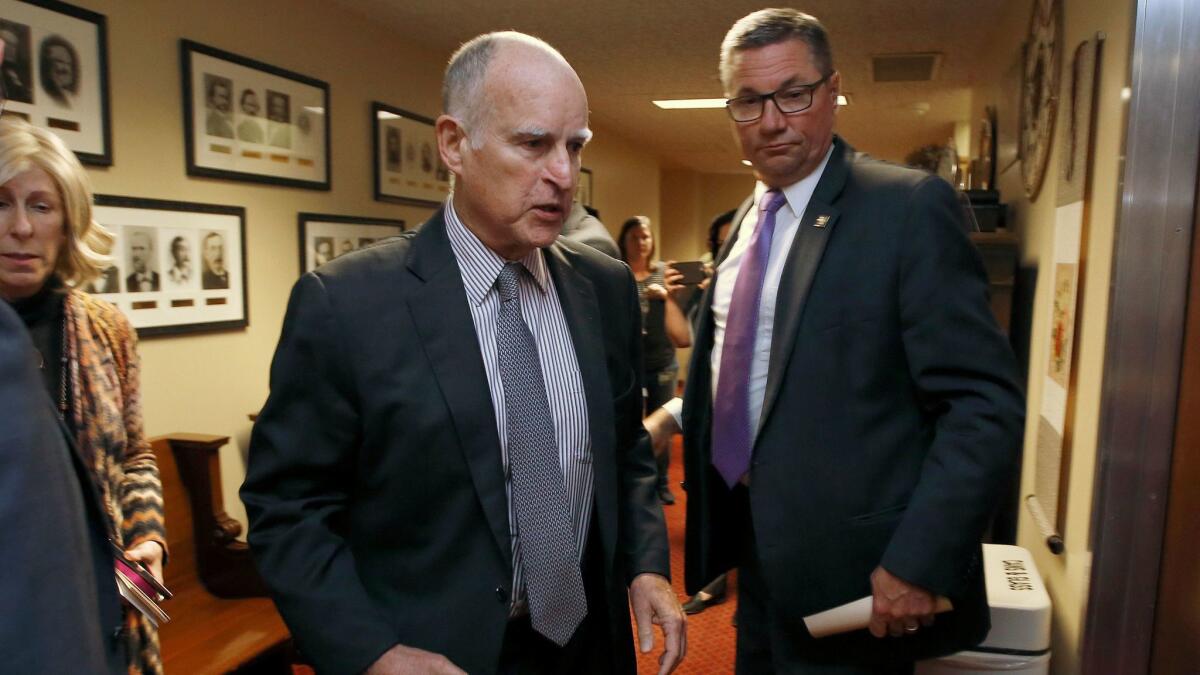Column: Political Road Map: Sacramento’s closed-door dealmaking didn’t go away with Proposition 54

- Share via
Sacramento — The lesson learned after last week’s vote in Sacramento on an expansive $52-billion transportation plan is a familiar one: You can’t take the politics out of politics.
And that’s true even after voters imposed a new rule requiring most legislation be available for public review at least 72 hours before passage out of the state Assembly or Senate. The big transportation bill met the test, but there were substantial policy deals — in separate legislation — rolled out just hours before the vote as concessions made to key lawmakers.
“So much of what all of us do around here is for an audience outside the fish bowl,” said Keith Dunn, one of scores of lobbyists who closely watched the transportation debate. “But the fish bowl remains the same for us fish.”
The fish still have a few hiding places under Proposition 54, the new constitutional mandate for legislative transparency. And we’re likely to see them dart into those dark corners more often when it comes to bills that require a two-thirds supermajority in each house.
Prior to 2011, that high vote threshold included bills related to the state budget, a key reason the spending plans were habitually late and laden with pork-barrel political offerings to woo a handful of reluctant legislators. Once voters changed the budget rules, it’s rarely been hard to get a simple majority of Democrats to sign off on a spending plan.
Political Road Map: A firm cap on state spending could be back in play in Sacramento in 2017 »
But tax increases still require a supermajority. And Democrats were long divided over the substantial hikes in fuel taxes and vehicle fees contained in the transportation plan, Senate Bill 1. They’d been given an April 6 deadline by legislative leaders and Gov. Jerry Brown, the final day before the Legislature’s spring recess.
Under Proposition 54, that meant that no vote could be taken if the bill’s contents weren’t locked in by April 3. Advocacy groups that drafted the ballot measure made it clear last week that they were watching.
It takes away a lot of your flexibility.
— Senate President Pro Tem Kevin de León on Proposition 54, the new mandate for legislative transparency
“If the Legislature does not follow this requirement before voting to pass a bill, that bill would not be constitutionally passed and would not be eligible to become a law,” they wrote in a letter to lawmakers Monday.
“It takes away a lot of your flexibility,” said Senate President Pro Tem Kevin de León (D-Los Angeles) of the new transparency mandate.
Yes, but not all of it. When Brown and Democratic leaders realized they were coming up short, they met behind closed doors with a handful of fence-sitting legislators. Unable to rewrite the transportation bill, they instead privately rewrote two other bills worth almost $1 billion in government projects in those lawmakers’ districts. The first of the side deals was made public at 4 a.m. Thursday. The second was introduced in the Senate at 2 p.m. — less than nine hours before the multibillion-dollar transportation bill was approved.
Because the other bills won’t be brought up for a vote until later this spring, Proposition 54 was never breached. Even so, those who were unhappy with billions in newly approved gas taxes and vehicle fees had almost no time to take stock of the deal that settled the issue.
New rules, yes, but the same politics of necessity.
“I certainly think that we’re not handcuffed,” said Assemblyman Ken Cooley (D-Rancho Cordova), who was a veteran Capitol staffer before being elected in 2012. “The tools in the legislative tool kit are vast for knocking burrs off issues, if people have the resolve to do that.”
Critics may bristle at likening taxpayer-funded deals to tidying up messy political debates. But it’s Cooley’s last point that is probably the one to remember: When there’s a political will, there’s still a legislative way.
Follow @johnmyers on Twitter, sign up for our daily Essential Politics newsletter and listen to the weekly California Politics Podcast
ALSO:
Voters chose transparency in Prop 54, but interpretation is the issue for the Legislature
Political Road Map: California has some $55 billion in tax breaks, and many are here to stay
Updates on California politics and government
More to Read
Get the L.A. Times Politics newsletter
Deeply reported insights into legislation, politics and policy from Sacramento, Washington and beyond. In your inbox twice per week.
You may occasionally receive promotional content from the Los Angeles Times.









